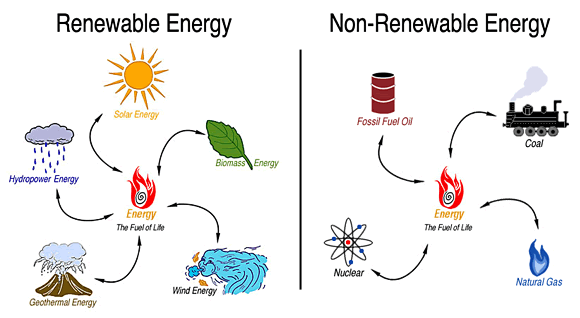As non-renewable resources run out, designers need to develop innovative solutions to meet basic human needs for energy, food and raw materials. The development of renewable and sustainable resources is one of the major challenges of the 21st century for designers.
Much of the development of new resources is the product of creating sustainable solutions to existing problems.
The legacy of the industrial revolution is now being felt as we face resource depletion. The challenge for designers is to continue to develop products that meet the needs of humans, while conserving the environment for future generations.
Renewable and Non-Renewable Resources
Renewable resource
Term: A natural resource that can replenish with the passage of time or does not abate at all
- These include, solar, wind, hydro, wave, tidal, thermal and bio fuels
- A natural resource qualifies as a renewable resource if it is replenished by natural processes at a rate almost the same as its rate of consumption by humans or other users.
Renewability
Term: This term refers to a resource that is inexhaustible therefore can be replenished quick enough.
- Hardwood trees (such as many rainforest species) take a fair bit of time to mature to a point where is is useable as a resource, therefore, it is considered non-renewable. On the other hand, softwoods (such as pines or conifers) mature more quickly and are considered a renewable resource.

Non-renewable resources
Term: A natural resource that does not replenish at a sustainable rate; a source that will run out if the rate of extraction is maintained.
- These include fossil fuels such as natural gas, oil, coal, gasohol and nuclear energy
- These resources are very useful sources of energy. This energy is needed to manufacture products and provide power to businesses, factories and homes.
- The bad aspect about this is that these resources are running out and the human dependency on them is very high.
Reserves
Term: A natural resource that has been identified in terms of quantity and quality.
- A proven reserve are those resources that can be economically and technically extracted.
- Reserves exist but it might not be viable at this moment such as gold in seawater
Economic and Political Importance
The extraction of oil has been at the centre of may issues removing around resource security and international treaties. Students need to understand the issues/impact surrounding resources security for Nations/Governments and international treaties.
- Governments need to balance the economic benefits and political impact (including social aspects) of resource extraction.
- The Invasion of Kuwait in 1990 is one such example. Iraq was accusing the Kuwait government of ‘slant drilling‘ from the border into Iraqi reserves thus stealing Iraqi oil. It is also thought to be that Iraq invaded in order to procure Kuwaiti oil that were considered to be 20% of the global reserves. A third reason was that Kuwait was over producing oil this dropping the price of global oil which affect the Iraqi economy.
- Often, multinational companies licensed to extract resources have limited consideration for the local population.
- Oil companies are often brought into country to explore possible new fields and then develop them. The oil companies pay the government a set amount which can develop wealth. This can produce local employment and other opportunities.
- Rare earth minerals/elements which are highly desired/needed and valuable came with a set of issues. For the countries that have them can receive a financial windfall, local communities gain skilled employment, however, the environmental impact for local communities is damaging. An article from the TheGuardian.
- The economic and political importance of material and land resources and reserves considering:
- set-up cost – typically are high and perhaps national/local governments cannot afford to set-up the infrastructure and the extraction site so outside multi-nationals could be invited.
- efficiency of conversion –
- sustainable and constant supply –
- social impact – can bring jobs (skilled and unskilled) and wealth, employment could be permanent or temporary (short term excavation/extraction),
- environmental impact – as mentioned above
- decommissioning – economically quite expensive especially with nuclear reactors
International Mindedness
The impact of multinational companies when obtaining resources in different countries/ regions can be a significant issue for the local population and have major social, ethical and environmental implications.
Theory of Knowledge
To what extent should potential damage to the environment limit our pursuit of knowledge?
Something Extra …
- More about Rare earth on Geogology.com
